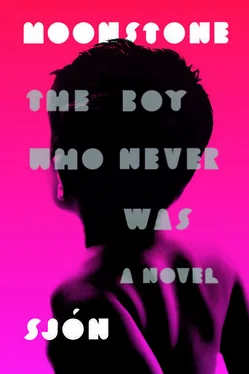The boy watches the figures. From where he is standing he cannot see what they see. He draws the red scarf from his pocket. The shiny fabric slips through his fingers like quicksilver, red as her lips, red as her motorcycle, red as the ferment in his blood.
The red of the scarf is the only color that matters to him tonight; his whole world is red.
* * *
In a three-story house on Midstræti the boy climbs up to the attic, which is home to himself and his great-grandmother’s sister. It is kitchen, parlor, and two bedrooms, all rolled into one. He makes his way to his bed, timing his footsteps to the old lady’s regular intakes of breath.
Noiselessly he undresses and lies down under the covers. He puts on the scarf, though the old lady has told him many times that it’s certain death to sleep with anything around your neck. She knows countless tales of people who have hanged themselves in their sleep.
But the boy is sixteen now; he does what he likes. If he wants to hang himself with a silk scarf that is fragrant with the scent of the motorcycle girl, Sóla G—, that’s just what he’ll do.
* * *
Toward morning he dreams about the gentleman of the night before.
It seems to him that he is looking into a bedroom with rose-patterned wallpaper, velvet curtains, and a luxuriously made-up bed with plump pillows and a thick eiderdown. On the wall above the headboard hangs a painting in a gilt frame, depicting a gabled, turf-roofed farmhouse at the foot of a high mountain with four peaks, and a river in the foreground. To the boy it looks like the farm where he used to live with his mother until she died and he was sent away.
The man enters the room. He takes off his dressing gown, hangs it over the back of a chair, and climbs into the bed. Then he turns to the painting and runs his fingers along the gilt frame. At that the painting slides to one side, like a panel from a hatch, to reveal a secret compartment containing a casket the size of a beer crate. The man lifts this out of the cavity, places it on the bedside table, and opens it. Inside is a human head with curly red hair. The boy recognizes his own head.
The man lies down in bed, takes the boy’s head out of the casket, and lays it on the pillow beside him, then draws up the quilt to its chin. The head’s eyes open.
From the pillow the boy can see his body standing at the foot of the bed, dressed up in his Sunday best but lacking a head.
His head begins to laugh; the body shakes with laughter.
Reykjavík has two picture houses, the Old Cinema and the New Cinema. Films are shown daily at both, one or two on working days and three on Sundays. Each screening lasts from one to two and a half hours, though lately films have become so long that they sometimes have to be shown over consecutive evenings.
The boy watches all the movies that are imported to Iceland. As a rule, he goes to both cinemas on the same day and sees most films as often as he can.
* * *
He was eleven years old when he saw his first motion picture, in the autumn of 1913. On the first day of summer that year, Pastor Fridrik, public benefactor to the boys of the town, had founded within the YMCA movement a brigade modeled on foreign scout troops, called the Varangians after the Norse warriors who had once fought for the emperors of Byzantium. The old lady had got wind of this and, on the strength of her connection with the man of God — she’d shared a bed with Pastor Fridrik’s maternal aunt for a whole winter when they were both young hired hands — pleaded with him to accept into the Varangian troop an unfortunate orphan whose upbringing had been dumped on her five years before.
She had, she said, no more idea than anyone else from the countryside how to bring up a child in town; the boy was an outsider and at the age when, if nothing were done, he would join the rabble of little savages who roamed Reykjavík’s main street, squealing like pigs, chucking horse manure at passersby, and tipping over cyclists. Either that or — which she found more likely — he would end his days in the attic, since he was already such a loner that rather than go out and play with his classmates he preferred to hang around at home, smoking cigarettes with her.
The boy had overheard her saying something of the sort to Pastor Fridrik, since he had been ordered to wait outside in the passage, munching hard candies, while they had their talk.
Once the old lady had finished her piece, the boy was summoned into the office. Imposing youth leader and puny youngster looked one another in the eye. After they had studied each other for a while, Pastor Fridrik announced:
— He’s a promising lad. I’ll take him.
Then, stroking his distinguished beard, he added:
— But he’ll have to stop smoking.
The business of being a Varangian turned out to be insufferably dull. The other youths knew the boy from school and shunned him just as they did there. It all boiled down to being a strapping young man and currying favor with the patrol leaders who led the brigade in the scout training that was intended to enhance their virility and mental powers. Most bearable for the boy were the occasions when they were permitted to dress up in the costume of the Varangian Guard, after the fashion of the men of old, in blue-and-white tunic, red cloak, and blue-and-red cap, both because he enjoyed making his cloak swirl around his thighs and because it allowed him to become somebody else.
Then, on the first day of winter, the proprietor of the Old Cinema invited the Varangians to attend the premiere of The White Glove Band , on condition that they turn up in their full regalia.
That night, for the first time that he could remember, the boy dreamed.
The Varangians made no further trips to the cinema, so he stopped attending. Instead, he made a pact with the old lady that providing he didn’t take up smoking again, he would be allowed to go to the pictures.
* * *
And now the boy lives in the movies. When not spooling them into himself through his eyes, he is replaying them in his mind.
Sleeping, he dreams variations on the films, in which the web of incident is interwoven with strands from his own life.
But he has yet to dream of Sóla G—.
The boy is loafing idly on the pavement outside Hotel Iceland. He has just emerged from the Chaplin film at the New Cinema and is waiting to go to the latest Fatty caper at nine o’clock on the other side of the square. Both the town’s screens are showing nothing but riotous comedies, presumably because today a referendum is being held on the country’s independence, and life is supposed to be fun. Not that the boy is affected by the fuss, as he has no more right to vote than anyone else under forty. Still, the clowning and slapstick of Fatty and Chaplin can be enjoyed at any age and can just as easily raise a laugh for the twenty-third time.
There’s a convivial atmosphere around the hotel, as there always is when a passenger ship is in port. The steamer Botnia docked at coffee time, having voyaged from Copenhagen with a cargo of people and freight. Men and women of the better sort wander in and out of the lobby; strange languages hover in the air, mingling with the fragrant blue tobacco smoke from cigarettes and cigars; the town’s followers of fashion are out in force to cast an eye over the foreign visitors’ tailoring, and in the hotel dining room a brand-new gramophone record is playing. Interspersed with this modern feast for the senses is a cacophony of barking and neighing, creaking of harnesses, and shouts of “ho, ho, ho,” while piles of dung, deposited by the horses of recent arrivals from over the mountains, steam gently in the cool evening air.
Читать дальше












